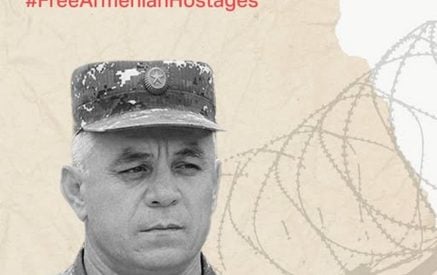120,000 Armenians living in Nagorno-Karabakh are without food and medical supplies due to a blockade by Azerbaijan
By Andrew Mark Miller
Rep. Chris Smith, R-N.J., has sent a letter to the Biden White House imploring it to speak out against genocide against Armenians in the Nagorno-Karabakh region and clarify that the U.S. will not “compromise” with Azerbaijan in the conflict.
Read also
“In light of the compelling and urgent testimony provided, I respectfully urge you to immediately clarify that the United States does not tolerate, facilitate, or participate, in negotiations over genocide, and to publicly inform Azerbaijan that unless it immediately lifts its blockade of Nagorno-Karabakh, the U.S. will take action through the United Nations to refer the matter to the International Criminal Court for investigation and prosecution,” Smith wrote to President Biden in a Thursday letter.
The testimony Smith referenced was from Luis Moreno Ocampo, former chief prosecutor of the International Criminal Court, who testified in front of the bipartisan Tom Lantos Human Rights Commission, which Smith co-chairs, on Thursday.
Ocampo told the commission “there is a reasonable basis to believe that Azerbaijan’s blockade of the Lachin Corridor constitutes genocide” and that Azerbaijan’s president, Ilham Aliyev, “voluntarily, knowingly, and willingly created conditions calculated to destroy 120,000 Armenians living in Nagorno-Karabakh.”
In his letter, Smith expressed concern that Secretary of State Antony Blinken recently said there is a “need for a dialogue and compromise and the importance of building confidence between the parties.”
“Mr. President, there is little doubt that this humanitarian crisis was planned, tested, and imposed by President Ilham Aliyev, who rules Azerbaijan as a dictator. His record of human rights abuses is decades in the making as I met with him in Baku in 2013 and 2014 arguing then about both his mistreatment and jailing of Azerbaijani human rights activists and abusive treatment of Armenian Christians,” Smith wrote.
He continued, “Thus by encouraging ‘compromise,’ the Secretary appears to facilitate Azerbaijan’s use of genocide as a negotiating tactic. Negotiation may be needed to solve the differences between Azerbaijan and the Armenians living in Nagorno-Karabakh, but genocide is an abuse impossible to ignore.”
Nagorno-Karabakh is a region within Azerbaijan that came under the control of ethnic Armenian forces backed by the Armenian military in separatist fighting that ended in 1994. Armenian forces also took control of substantial territory around the region.
Azerbaijan regained control of the surrounding territory in a six-week war with Armenia in 2020. A Russia-brokered armistice that ended the war left the region’s capital, Stepanakert, connected to Armenia only by a road known as the Lachin Corridor, along which Russian peacekeeping forces were supposed to ensure free movement.
However, over the past nine months, the road has been blockaded by Azerbaijani forces in what they say is a move to prevent “arms smuggling.”
Armenia says the blockade of the “Lachin corridor,” known as “the road of life” by ethnic Armenians in Karabakh, has caused acute shortages of food, medicines and other essentials.
Azerbaijan claims it has let the Red Cross evacuate people to Armenia for medical treatment and that its own information shows there is no shortage of basic food staples, but it has not allowed food and other supplies in for some time.
“The Biden Administration must wake up, recognize the absolutely grave responsibility it has here, and focus on finding and implementing a humane solution,” Smith said in a press release. “And this must mean that the blockade is lifted and the people continue to live in their ancient homeland — and not be subject to violence and threats. This situation is now a three-alarm fire.”
The White House directed Fox News Digital to an Aug. 31 release from the State Department on the matter.
“We are deeply concerned about deteriorating humanitarian conditions in Nagorno-Karabakh resulting from the continued blockage of food, medicine, and other goods essential to a dignified existence,” the statement said.
“The United States has worked continuously with the sides over the past several weeks to allow humanitarian assistance to reach the population of Nagorno-Karabakh. We reiterate our call to immediately re-open the Lachin corridor to humanitarian, commercial, and passenger traffic. Further, officials from Baku and representatives from Stepanakert should convene without delay to agree on the means of transporting critical provisions to the men, women, and children of Nagorno-Karabakh — including additional supply routes — and resume discussions on all outstanding issues. Basic humanitarian assistance should never be held hostage to political disagreements.”
The Associated Press and Reuters contributed to this report.

























































